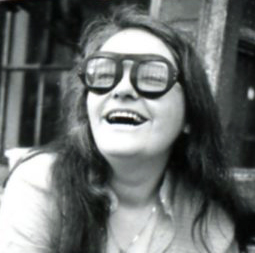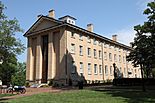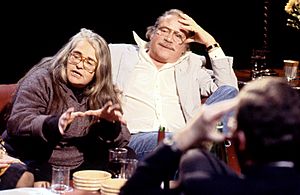Kate Millett facts for kids
Quick facts for kids
Kate Millett
|
|
|---|---|

Photograph by Linda Wolf, 1970
|
|
| Born | Katherine Murray Millett September 14, 1934 Saint Paul, Minnesota, U.S. |
| Died | September 6, 2017 (aged 82) Paris, France |
| Occupation |
|
| Education | |
| Notable works |
|
| Spouse |
|
| Signature | |
 |
|
| Scientific career | |
| Influences | Simone de Beauvoir |
Katherine Murray Millett (September 14, 1934 – September 6, 2017) was an American feminist writer, educator, artist, and activist. She attended the University of Oxford and was the first American woman to be awarded a degree with first-class honors after studying at St Hilda's College, Oxford. She has been described as "a seminal influence on second-wave feminism".
The feminist, human rights, peace, civil rights, and anti-psychiatry movements were some of Millett's principal causes. Her books were motivated by her activism, such as woman's rights and mental health reform. In the 1960s and 1970s, Millett taught at Waseda University, Bryn Mawr College, Barnard College, and the University of California, Berkeley. Some of her later written works are The Politics of Cruelty (1994) and Mother Millett (2001). Between 2011 and 2013, she won the Lambda Pioneer Award for Literature, received Yoko Ono's Courage Award for the Arts, and was inducted into the National Women's Hall of Fame.
Millett was born and raised in Minnesota, and then spent most of her adult life in Manhattan and the Woman's Art Colony, established in Poughkeepsie, New York, which became the Millett Center for the Arts in 2012. Millett came out as a lesbian in 1970. However, late in the year 1970 she came out as bisexual. She was married to sculptor Fumio Yoshimura (1965 to 1985) and later, until her death in 2017, she was married to Sophie Keir.
Early life and education
Katherine Murray Millett was born on September 14, 1934, to James Albert and Helen (née Feely) Millett in Saint Paul, Minnesota. According to Millett, she was afraid of her father, an engineer, who beat her. He abandoned the family when she was 14, "consigning them to a life of genteel poverty". Her mother was a teacher and insurance saleswoman. She had two sisters, Sally and Mallory; the latter was one of the subjects of Three Lives. Of Irish Catholic heritage, Kate Millett attended parochial schools in Saint Paul throughout her childhood.
Millett graduated in 1956 magna cum laude from the University of Minnesota with a Bachelor of Arts degree in English literature; she was a member of the Kappa Alpha Theta sorority. A wealthy aunt paid for her education at St Hilda's College, Oxford gaining an English literature first-class honors degree in 1958. She was the first American woman to be awarded a degree with first-class honors having studied at St. Hilda's. After spending about 10 years as an educator and artist, Millett entered the graduate school program for English and comparative literature at Columbia University in 1968, during which she taught English at Barnard. While there, she championed student rights and women's liberation. She completed her dissertation in September 1969 and was awarded her doctorate, with distinction, in March 1970.
Career
Early career as an artist and educator
  |
  |
Clockwise from upper left:
|
Millett taught English at the University of North Carolina after graduating from Oxford University, but she left mid-semester to study art.
In New York City she worked as a kindergarten teacher and learned to sculpt and paint from 1959 to 1961. She then moved to Japan and studied sculpture. Millett met fellow sculptor Fumio Yoshimura, had her first one-woman show at Tokyo's Minami Gallery, and taught English at Waseda University. She left Japan in 1963 and moved to New York's Lower East Side.
Millett taught English and exhibited her works of art at Barnard College beginning in 1964. She was among a group of young, radical, and untenured educators who wanted to modernize women's education; Millett wanted to provide them with "the critical tools necessary to understand their position in a patriarchal society." Her viewpoints on radical politics, her "stinging attack" against Barnard in Token Learning, and a budget cut at the college led to her being dismissed on December 23, 1968. Her artwork was featured in an exhibit at Greenwich Village's Judson Gallery. During these years Millett became interested in the peace and Civil Rights Movement, joined the Congress of Racial Equality (CORE), and participated in their protests.
In 1971, Millett taught sociology at Bryn Mawr College. She started buying and restoring property that year, near Poughkeepsie, New York; this became the Women's Art Colony and Tree Farm, a community of women artists and writers and Christmas tree farm. Two years later she was an educator at the University of California, Berkeley.
The 1980s through 2000s

In 1980, Millett was one of the ten invited artists whose work was exhibited in the Great American Lesbian Art Show at the Woman's Building in Los Angeles, although Millett identified as bisexual. Millett was also a contributor to On the Issues magazine, and continued writing into the early 2000s. She discussed state-sanctioned torture in The Politics of Cruelty (1994), bringing attention to the use of torture in many countries.
Millett was involved in the controversy resulting from her appearance on a UK television programme called After Dark. Actor Oliver Reed, who had been drinking during the programme, moved in on her and tried to kiss her. Millett pushed him away but reportedly later asked for a tape of the show to entertain her friends. Throughout the programme Reed used sexist language.
Millett was also involved in prison reform and campaigns against torture. Journalist Maureen Freely wrote of Millett's viewpoint regarding activism in her later years: "The best thing about being a freewheeler is that she can say what she pleases because 'nobody's giving me a chair in anything. I'm too old, mean and ornery. Everything depends on how well you argue.'" In 2012, The Women's Art Colony became a 501(c)3 non-profit organization and changed its name to the Millett Center for the Arts.
Activism
Feminism
Millett was a leading figure in the women's movement, or second-wave feminism, of the 1960s and 1970s. For example, she and Sidney Abbott, Phyllis Birkby, Alma Routsong, and Artemis March were among the members of CR One, the first lesbian-feminist consciousness-raising group, although Millett identified as bisexual by late 1970.
In 1966, Millett became a committee member of National Organization for Women and subsequently joined the New York Radical Women, Radical lesbians, and Downtown Radical Women organizations.
Millett was one of the first writers to describe the modern concept of patriarchy as the society-wide subjugation of women. Millett wrote several books on women's lives from a feminist perspective. For instance, in the book The Basement: Meditations on a Human Sacrifice (1979), completed over four years, she chronicled the murder of Indianapolis teenager Sylvia Likens by Gertrude Baniszewski in 1965 that had preoccupied her for 14 years.
Millett and Sophie Keir, a Canadian journalist, traveled to Tehran, Iran in 1979 for the Committee for Artistic and Intellectual Freedom to work for Iranian women's rights. Their trip followed actions taken by Ayatollah Khomeini's government to prevent girls from attending schools with boys, to require working women to wear veils, and not to allow women to divorce their husbands. Thousands of women attended a protest rally held at Tehran University on International Women's Day, March 8. About 20,000 women attended a march through the city's Freedom Square. Millett and Keir, who had attended the rallies and demonstrations, were removed from their hotel room and taken to a locked room in immigration headquarters two weeks after they arrived in Iran. They were threatened that they might be put in jail. After an overnight stay, the women were put on a plane that landed in Paris. Although Millett was relieved to have arrived safely in France, she was worried about the fate of Iranian women left behind, "They can't get on a plane. That's why international sisterhood is so important." She wrote about the experience in her 1981 book Going to Iran. Millett is featured in the feminist history film She's Beautiful When She's Angry (2014).
Academic works
Sexual Politics
Sexual Politics originated as Millett's PhD dissertation and was published in 1970, the same year that she was awarded her doctorate from Columbia University. The bestselling book, a critique of patriarchy in Western society and literature, addressed the sexism and heterosexism of the modern novelists D. H. Lawrence, Henry Miller, and Norman Mailer. Millett questioned the origins of patriarchy, argued that sex-based oppression was both political and cultural. In its first year on the market, the book sold 80,000 copies and went through seven printings and is considered to be the movement's manifesto.
Mother Millett
Kate wrote Mother Millett (2001) about her mother, who in her later years developed several serious health problems, including a brain tumor and hypercalcaemia. Made aware of her mother's declining health, Millett visited her in Minnesota; their visits included conversations about their relationship and outings to baseball games, museums, and restaurants. When her mother was no longer able to care for herself in her apartment, she was placed in a nursing home in St. Paul, Minnesota, which was one of Helen Millett's greatest fears. Kate visited her mother and was disturbed by the care she received and her mother's demoralized attitude. Nursing home residents who were labeled as "behavioral problems", as Helen was, were subject to forcible restraint. Helen said to Kate, "Now that you're here, we can leave."
Aware of the efforts her mother made to give her life, support her and raise her, Millett became a care-giver and coordinator of many daily therapies, and pushed her mother to be active. She wanted to give her "independence and dignity". In the article "Her Mother, Herself", Pat Swift wrote: "Helen Millett might have been content to go "gently into that good night"—she was after all more afraid of the nursing home than dying—but daughter Kate was having none of that. Feminist warrior, human rights activists, gay liberationist, writer and artist, Kate Millett has not gone gently through life and never hesitates to rage at anyone—friend or foe, family or the system—to right a perceived wrong. When the dignity and quality of her ailing mother's life was at stake, this book's unfolding tale became inevitable." Even though Helen played a role in having her daughter committed to the University of Minnesota's Mayo wing, Kate had her mother removed from the nursing home and returned to her apartment, where attendants managed her care. During this period, Millett could also "bully" her mother for her lack of cultural sophistication and the amount of television she watched and could be harsh with caregivers.
Personal life
Interpersonal relationships
Millett was not the "polite, middle-class girl" that many parents of her generation and social circle desired; she could be difficult, brutally honest, and tenacious. Liza Featherstone, author of "Daughterhood Is Powerful," says that these qualities helped to make her "one of the most influential radical feminists of the 1970s." They could also make for difficult interpersonal relationships. Millett wrote several autobiographical memoirs, with what Featherstone calls "brutal honesty," about herself, her husband, lovers, and family. Her relationship with her mother was strained by her radical politics, domineering personality, and unconventional lifestyle. Helen was particularly upset about examination of her lesbianism in her books. (Note that Millett identified as bisexual by late 1970.) Family relationships were further strained after Millett was involuntarily committed to psychiatric wards and again when she wrote The Loony Bin Trip.
Millett focused on her mother in Mother Millett, a book about how she was made aware by her sister Sally of the seriousness of Helen Millett's declining health and poor nursing home care. Kate removed her mother from the home and returned her to an apartment, where caregivers managed her health and comfort. In the book, "Millett writes about the situation—her mother's distance and imperiousness, her family's failure to recognize the humanity of the old and the insane—with brutal honesty. Yet she also describes moments of forgiveness, humility and admiration." During this time, she developed a close relationship, previously inconceivable, with her mother, which she considered "a miracle and a grace, a gift." Her relationships with her sisters were troubled during this time, but they all came to support their mother's apartment-living. The suggestion of her role as the heroine in Mother Millett, however, may have been "at the expense of her two siblings".
Marriage
In 1961 Millett moved to Japan and met fellow sculptor Fumio Yoshimura. In 1963 Yoshimura and Millett left Japan and moved to New York's Lower East Side in the Bowery district. In 1965 they married to prevent Yoshimura from being deported, and during their marriage Millett said that they were "friends and lovers". She dedicated her book Sexual Politics to him. Author Estelle C. Jelinek says that during their marriage he "loves her, leads his own creative life, and accepts her woman lovers". In 1985 they were divorced. At the time of her death, Millett had recently married Sophie Keir, her partner for 39 years.
Mental illness
Mental illness affected Millett's personal and professional life from 1973, when she lived with her husband in California and was an activist and teacher at the University of California, Berkeley. Yoshimura and Sally, Kate's eldest sister, became concerned about Kate's extreme emotions. Her family claimed that she went for as many as five consecutive nights without sleep and could talk nonsensically for hours. She was confined to mental hospitals several time to get treatment for her illness.
Activism
Angered by institutional psychiatric practices and lenient involuntary commitment processes, Millett became an activist. With her lawyer, she changed the State of Minnesota's commitment law so that a trial is required before a person is involuntarily committed.
Millett was active in the anti-psychiatry movement. As a representative of MindFreedom International, she spoke out against psychiatric torture at the United Nations during the negotiations of the text of the Convention on the Rights of Persons with Disabilities (2005).
In 1978, Millett became an associate of the Women's Institute for Freedom of the Press (WIFP). WIFP is an American nonprofit publishing organization. The organization works to increase communication between women and connect the public with forms of women-based media.
Bowery redevelopment
In the late 1990s and early 2000s, Millett was involved in a dispute with the New York City authorities, who wanted to evict her from her home at 295 Bowery as part of a massive redevelopment plan. Millett and other tenants held out but ultimately lost their battle. Their building was demolished, and the residents were relocated.
Death
Millett died in Paris on September 6, 2017, from cardiac arrest, eight days before her 83rd birthday. Her spouse Sophie Keir was with her at the time of her death.
Awards and honors
Millett won the Best Books Award for Mother Millett from Library Journal in 2001. In 2012, she was awarded one of that year's Courage Award for the Arts by Yoko Ono, which Ono created to "recognize artists, musicians, collectors, curators, writers—those who sought the truth in their work and had the courage to stick to it, no matter what" and "honor their work as an expression of my vision of courage". Between 2011 and 2012, she was also awarded the Lambda Pioneer Award for Literature and a Foundation for Contemporary Arts Grants to Artists award (2012). She was honored in the summer of 2011 at a Veteran Feminists of America gala; attendees included feminists such as Susan Brownmiller and Gloria Steinem.
In March 2013, the U.S. National Women's Hall of Fame announced that Millett was to be among the institution's 2013 inductees. Beverly P. Ryder, board of directors co-president, said that Millett was a "real pillar of the women's movement". The induction ceremony took place on October 24, 2013, at the National Women's Hall of Fame headquarters in Seneca Falls, New York.
See also
 In Spanish: Kate Millett para niños
In Spanish: Kate Millett para niños

